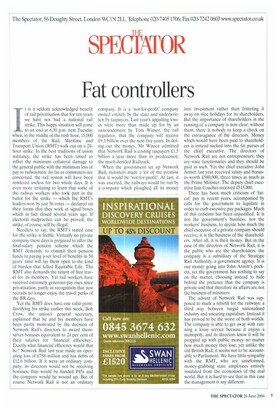SPECTATOR
Fat controllers
1 t is a seldom acknowledged benefit of rail privatisation that for ten years we have not had a national rail strike. This happy situation will come to an end at 6.30 p.m. next Tuesday when, in the middle of the rush hour, 15,000 members of the Rail, Maritime and Transport Union (RMT) walk out on a 24hour strike. In the best traditions of union militancy, the strike has been timed to inflict the maximum collateral damage to the general public with the minimum loss of pay to railwaymen. As far as commuters are concerned, the rail system will have been rendered useless for two whole days. It is even more irritating to learn that some of the railway workers who took part in the ballot for the strike — which the RMT's leaders won by just 56 votes — declared on their forms that they work at signal boxes which in fact closed several years ago. If electoral malpractice can be proved, the strike, of course, will be illegal.
Needless to say, the RMT's stated case for the strike is feeble. Virtually no private company these days is prepared to offer the final-salary pension scheme which the RMT demands: to commit their pension funds to paying a set level of benefits in 50 years' time will lay them open to the kind of burden that felled Equitable Life. The RMT also demands the return of free travel for its members. Yet rail workers have received extremely generous pay rises since privatisation, partly in recognition that new recruits no longer enjoy the travel perks of the BR days.
Yet the RMT does have one valid point. Justifying his strike earlier this week, Bob Crow, the union's general secretary, explained that he and his members have been partly motivated by the decision of Network Rail's directors to award themselves bonuses equivalent to 24 per cent of their salaries for 'financial efficiency'. Exactly what financial efficiency would that be? Network Rail last year made an operating loss of £758 million and has debts of £12.6 billion. If it were an ordinary company, its directors would not be receiving bonuses; they would be handed P45s and the company would be wound up. But of course Network Rail is not an ordinary company. It is a 'not-for-profit' company owned entirely by the state and underwritten by taxpayers. Last year's appalling losses were more than made up for by an announcement by Tom Winsor, the rail regulator, that the company will receive £9.3 billion over the next five years. In doling out the money, Mr Winsor admitted that Network Rail is costing taxpayers £1.5 billion a year more than its predecessor, the much-derided Railtrack.
When the government set up Network Rail, ministers made a lot of the promise that it would be 'not-for-profit'. At last, it was asserted, the railways would be run by a company which ploughed all its money into investment rather than frittering it away on nice holidays for its shareholders. But the importance of shareholders in the running of a company is now clear: without them, there is nobody to keep a check on the extravagance of the directors. Money which would have been paid to shareholders is instead sucked into the fat purses of the chief executive. The directors of Network Rail are not entrepreneurs; they are state functionaries and they should be paid as such. Yet the chief executive John Armitt last year received salary and bonuses worth £580,000, three times as much as the Prime Minister. The deputy chief executive lain Coucher received £515,000.
There has been much criticism of 'fatcat' pay in recent years, accompanied by calls for the government to legislate in order to curb excessive pay packages. Much of this criticism has been unjustified. It is not the government's business, nor the workers' business, to decide how much the chief executive of a private company should receive; it is the business of the shareholders. After all, it is their money. But in the case of the directors of Network Rail, it is the public who are the shareholders: the company is a subsidiary of the Strategic Rail Authority, a government agency. It is our money going into John Armitt's pockets, yet the government has nothing to say on the matter, choosing instead to hide behind the pretence that the company is private and that therefore its affairs are not the business of ministers.
The advent of Network Rail was supposed to mark a rebirth for the railways: a third way between turgid nationalised industry and uncaring capitalism. Instead it has proved to be the worst of both worlds. The company is able to get away with running a lousy service because it enjoys a monopoly, and its directors know it will be propped up with public money no matter how much money they lose; yet unlike the old British Rail, it seems not to be accountable to Parliament. We have little sympathy with the RMT, who are unreformed, money-grabbing state employees entirely insulated from the economics of the real world. But it is hard to see that in this case the management is any different.


































































 Previous page
Previous page